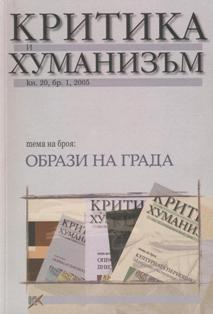Мишеловката
The mousetrap
Author(s): Aleksander KiossevSubject(s): Cultural Essay, Political Essay, Societal Essay
Published by: Фондация за хуманитарни и социални изследвания - София
Keywords: history of ideas; Visual seminar; visual environment; commercial architecture; civic position; civil rights; television
Summary/Abstract: The paper is an attempt to write a “history of ideas” of the Visual seminar, a joined project initiated by the Institute for Contemporary Art, Sofia, together with the Center for Advanced Study, Sofia. The Visual seminar is targeted at the modified visual environment of Sofia in the transition period, when the city was taken over by aggressive advertising images, new type of commercial architecture, and contemporary visual codes, making the city unbearable for the eye and hardly readable. The paper reports how the agenda of the Visual seminar to intervene into that problematic city-scape turned out to be immanently controversial, which resulted in identifying several differing positions: The civic position, claiming that visual environment is lived environment in need for protection after the model of civil rights; the policy position, searching for cooperation with municipal authorities; the activist position, standing for rapid and radical interference; the anarchist position, inclined to provocations and scandals at the edge of the law; the critical intellectual position, falling back on public critique; the pedagogic position, aspiring to “educate” and “enlighten” the eye, etc. The second part of the paper focuses on the individual project of the last fellow of the Visual seminar – the video-installation Visual Police by the theatrical director Yavor Gardev. It is construed as a successful example of synthesizing and overcoming the controversies in the Seminar agenda by means of a combined technique of “television realism” and theatrical mystification. What is insisted is that Gardev’s project introduces a new significant issue in the agenda of the Seminar: Viewing the city as a medium, Gardev is looking for the parallels between the city “screen” and the television screens. The installation implies that the medialization of the city is a complementary form of its being overloaded with images, a form that privatizes the public sphere and turns every discussion (interpreted here as a main form of achieving democracy) into a part of the image market.
Journal: Критика и хуманизъм
- Issue Year: 2005
- Issue No: 20
- Page Range: 53-74
- Page Count: 28
- Language: Bulgarian
- Content File-PDF

